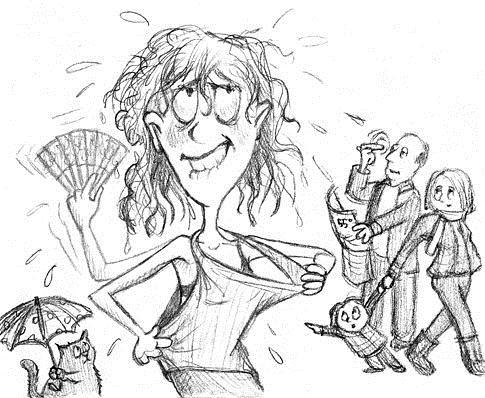Providing free online community support to people affected by breast cancer
Free Member Signup
Site Search
MENOPAUSE & HOT FLUSHES/HEAT SURGES
What is menopause?
Menopause is defined as the time in a woman’s life when her ovaries cease to function and menstrual periods stop. Every woman will go through menopause at some point, and the experience may vary from distressing symptoms to very little noticeable change. Natural menopause occurs around 45-55yrs of age, and may extend over several years of changes (peri-menopause) before finalising in cessation of menstrual periods (menopause). When 12 months or more has passed since the final menstrual period, this is termed ‘post-menopause’.
Treatments for breast cancer may induce menopause early, worsen symptoms for those already experiencing them, or cause a resurgence of symptoms for post-menopausal women. One of the most common and distressing symptoms that may be experienced is hot flushes.
What are hot flushes?
If you’ve ever experienced a ‘hot flush’ or heat surge, there’s no mistaking it! The sudden rush of intense ‘heat’ sensation in your face and body which may or may not be accompanied by sweating, palpitations, nausea, dizziness, anxiety, headache and a sense of weakness or suffocating, is often unpleasant and may be extremely unsettling. Some people experience an “aura” prior to each episode – i.e. a sense or awareness that an episode is about to happen.
For some women each episode may result in a soaking sweat and reddened face/upper torso along with a feeling of acute anxiety, confusion and exhaustion! For others this may be a brief sensation of intense heat that passes quickly. Often a ‘chill’ will follow as the episode settles.
What causes hot flushes?
The hormonal changes that occur during menopause result in decreased oestrogen production, affecting the hypothalamus - a gland in the brain responsible for temperature control, sleep pattern, metabolism (involving weight management and appetite) and varying other physical and psychological effects on the body. Although not fully understood, the hypothalamus appears at times to become ‘confused’ by hormone changes and reads the body’s temperature as “too hot” – sending an urgent signal to the heart, blood vessels and nervous system to “cool off” rapidly. This results in the heart pumping faster to send blood to the skin surface to expel heat, and sweat glands to release moisture to further cool the body. When these episodes occur at night they are referred to as ‘night sweats’.
Treatments for breast cancer may cause menopause to occur earlier and symptoms to be more severe, but the individual experience of these episodes often varies in intensity, duration and frequency, from one episode to another and from one woman to another, whether they have had breast cancer or not.
Triggers for hot flushes
Identifying triggers helps you to better manage and possibly reduce hot flush episodes. Keeping a record of activities when each episode occurs may help identify causes, which may allow you to either avoid or manage these ‘triggers’.
Triggers:
# alcohol # spicy food # caffeine # heating/ hot bed # hot drinks # saunas/spas # hot weather # smoking # synthetic materials # tight clothing
What can you do to reduce hot flushes?
Natural remedies that may help:
> Acupuncture
> Vitamin E supplements (~800 – 1000iu per day)
> Vitamin B6 supplements (200-250mg per day)
> Herbal remedies/preparations such as dong quai, ginseng, evening primrose oil, licorice root, red raspberry leaves, sarsaparilla, spearmint, damiana, motherwort, chasteberry (also known as Vitex), black cohosh, and wild yams. NB: Many of these preparations contain plant oestrogens (phyto-oestrogens) and their relative safety in women after breast cancer is not known.
Medications: Hormone Replacement Therapy (HRT) is often used to relieve hot flushes, but HRT is contraindicated after a diagnosis of breast cancer. There are several other types of medications that may help reduce frequency and severity of hot flushes. These include certain anti-depressants, blood-pressure medications, mild sedatives & anti-epileptic medications. Your doctor or specialist may discuss these with you, or refer to a specialist clinic such as a Menopause Clinic.
In WA the Menopause Symptoms After Cancer (MSAC) Clinic in Subiaco is part of the public health service and provides comprehensive assessment and management of menopause-related symptoms. Referral from a doctor or Breast Nurse is required. See link:
http://kemh.health.wa.gov.au/brochures/consumers/wnhs0323.pdf
The Cancer Council on 13 11 20 can provide further information and advice on similar services in other states.
Other sites for useful information:
Menopause Hot Flashes Symptoms, Causes, and Treatments
Hoping this information is useful. Please discuss with your doctor, nurse or other members of your treating team if any queries. I am very happy to discuss any aspects or answer any queries.
Please feel free to add comments … Love Glenys xx

The Click Breast Care Nurse 
The Click Breast Care Nurse 
The Click Breast Care Nurse 